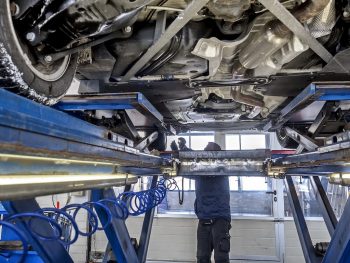MOT rules could be relaxed to help counter cost-of-living crisis
The annual MOT could be shifted to a two-year cycle under cost-of-living plans discussed by the Government.

The motoring sector has warned of repercussions for road safety if MOT regulations are relaxed
Transport Secretary Grant Shapps is said to have brought up the suggestion at a cabinet meeting held yesterday to find ways to put the brakes on the cost of living crisis but without cost to the Government.
Amid suggestions such as the Prime Minister’s call to relax regulations on childcare, Shapps suggested axeing the requirement for cars more than three years old to have an MOT every year and to switch instead to a biennial basis.
But the move would only save £27 a year and MPs have said it could actually increase costs if older cars became less fuel-efficient as a result.
The motoring sector has also warned of repercussions for road safety.
RAC head of policy Nicholas Lyes said: “The purpose of an MOT is to ensure vehicles meet a basic level of safety for driving on our roads. Shifting it from annually to every two years would see a dramatic increase in the number of unroadworthy vehicles and could make our roads far less safe.”
The AA also said that the MOT should remain once a year.
Jack Cousens, head of roads policy, commented: “Though well-intended, moving the yearly £55 spend on an MOT to every two years could make costs worse for drivers with higher repair bills, make our roads more dangerous and would put jobs in the garage industry at risk.
“Only recently the Government stepped away from switching the MOT to every two years on the grounds of road safety, while AA polling shows overwhelming support from drivers who like the security that an annual health check provides.
“The MOT now highlights major and dangerous defects too, showing how important it is to keep cars in a safe condition.
“Rather than fiddling at the edges, drivers would rather see pump price transparency to revive competition on the forecourts or expanding Park & Ride schemes so drivers can avoid higher inner-city driving costs.”
And the motor trade also urged the Government to reconsider an “ill thought-out and unsafe” proposal.
Sue Robinson, chief executive of the National Franchised Dealers Association (NFDA), said: “The NFDA is also deeply concerned that this proposal has been raised without prior consultation with the industry. The suggested move fails to take into account the investments franchised dealers have made in their equipment, workforce and facilities to provide drivers with an efficient and good value service.
“Additionally, the change would affect business confidence at a time when dealers and repairers alike are already facing a number of challenges as they recover from the pandemic and adapt to meet the Government’s ambitious net zero targets.
“An MOT is the best way to identify minor issues before they become serious problems, which are often more expensive to fix. The change would significantly increase the risk of defects in vehicles and have a detrimental impact on road safety as well as on motorists’ finances in the long term.
“Instead of reducing the frequency of MOT testing, we encourage the Government to review current road tax rates. This will bring immediate benefits to millions of motorists without hindering road safety”.













Victor Harman27. Apr, 2022
Another piece of brilliance from Grant Shapps! It would save a lot of precious fuel if they tightened the test and took a lot of dirty and inefficient old cars off the road. Hard t believe that after all the years since emissions have been regulated, the MOT still only uses a primitive optical smoke test..